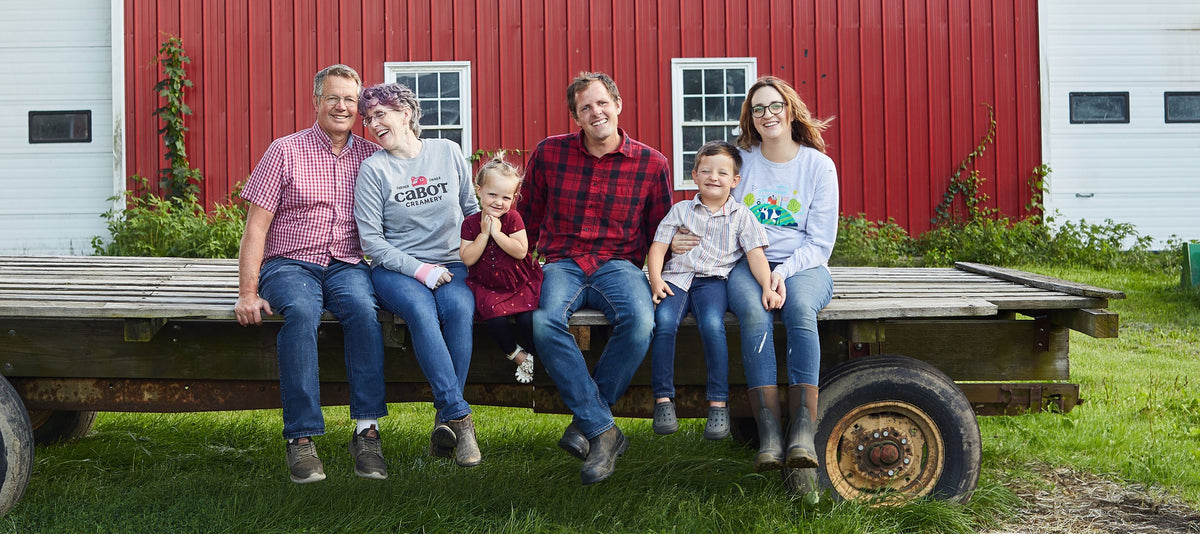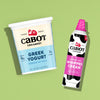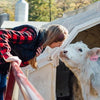
A 13-Generation Legacy: The Story of Luther Belden Farm
Luther Belden Farm boasts a remarkable farming legacy that spans over 13 generations, dating back to 1661. As a proud founding member of Agri-Mark, the cooperative that owns the Cabot brand, the farm produces milk used to make Cabot’s World’s Best Butter while embracing cutting-edge sustainability efforts like its anaerobic methane digester, which benefits the community and the environment.
Here at Cabot, we don’t like to play favorites when it comes to cheese or farms, but if we did, they’d be on the top of the list—the centuries-long history of Luther Belden Farm is incredible, and we’re so honored to share their moo-ving story.

Evolution Through the Generations
The farm's roots trace back to 1661, when Samuel Belden moved to Hatfield, Massachusetts, from Connecticut, beginning a legacy encompassing 13 generations. Initially ceded by Governor Bradstreet, the land has seen diverse cultivation, each generation adapting to the changing needs of each era.
In the 1600s, the farm was known for broomcorn and grazing animals. Then, in the early 20th century, it had become a significant player in the onion market, though it faced hardships during the Great Depression. Over the years, the farm has grown a variety of crops including potatoes, tobacco, cucumbers, and strawberries. Each generation, with unwavering resilience and adaptability, has navigated the currents of the market, showcasing the family's enduring spirit.

The productive land in the Connecticut River Valley strengthened the farm's legacy. As one could imagine, not only was the land rich in crops, but it was also abundant in family stories from over the years. It's captivating listening to current-day owner Darryl Williams share these stories. For example, during the Revolutionary War, it's believed that farms in Hatfield supplied beef to George Washington's army, and during WWII, German POWs assisted with harvests at the farm.

One of Luther Belden Farm's enduring landmarks is an onion warehouse built in 1909 during Calvin Coolidge's tenure as mayor of Northampton. Coolidge, who later became President, was familiar with the farm, and his son worked there one summer. The family proudly holds a letter from Coolidge to George Belden, a testament to its deep historical roots.
But perhaps the best era of Luthen Belden Farm, and maybe we're biased, was when it became a dairy farm in 1964, leading to a long partnership with what is now Argi-Mark Cooperative.
Proud Cooperative Members
In the 1960s, the farm transitioned to dairy farming, joining the Yankee Milk cooperative, a precursor to Agri-Mark. Darryl Williams' uncle was a director at Yankee Milk and played an instrumental part in transitioning the cooperative to Agri-Mark in 1980, which merged with Cabot in 1992. The farm's milk is a key ingredient to Cabot's award-winning cheeses and butter, most notably the World's Best Butter, made in nearby West Springfield.
"Every generation sees the co-op as important—we've been strong coop members all the way back to my grandfather, and we continue to see that as very important moving forward. We as dairy farmers work together to make it possible for all of us as dairy farmers to continue this way of life." -Darryl Williams

Embracing Innovation and Sustainability
Continuing the family's tradition of shifting and evolving with the times, Luther Belden Farm has embraced modern technology to enhance productivity and sustainability. In 2017, the farm built a new milking barn featuring a robotic milking system. The three-robot milking system has optimized the milking process and allowed the farmers to monitor cow health more effectively, allowing them to take even better care of the animals (making for happier cows!).
In 2018, Luther Belden Farm partnered with Ag-Grid Energy to build an anaerobic methane digester to further the family's commitment to sustainability. The digester began operating in 2019, taking in the farm's manure and food waste and converting it into energy, reducing methane released into the environment. The electricity is then sold to local municipalities like Hatfield, where the Williams children attend school. The digester's by-products are also used as natural fertilizer, closing the loop in a sustainable farming cycle.

The farm is also working to utilize the heat produced by the digester to heat the hot water in its barns, which will save on using propane and fuel, and hopes to one day utilize it in one of the houses on the farm to make them a bit more self-sustaining. Another poop perk? The digester allows them to be better neighbors. "We live on a residential road and have houses all around us. We are trying hard to be good neighbors, and the digestor helps change our smell factor a little bit," explains Darryl.
Looking to the Future
The story of Luther Belden Farm is one of resilience, adaptability, and a deep-rooted commitment to the land and community. The farm has practiced no-till farming for over a decade, preserving soil structure and reducing erosion. Intensive cover cropping helps feed their animals and protects the land, demonstrating their dedication to environmental stewardship.
With the youngest generation now leading Luther Belden Farm, the family remains dedicated to innovation and sustainability. Jackson Williams, who joined in 2010, represents the farm's future, continuing the family's legacy with a fresh perspective while exploring new technologies and practices to ensure the farm remains a model of responsible agriculture. From its robotic milking system and anaerobic digester to its longstanding cooperative membership, Luther Belden Farm is committed to a future where tradition and innovation go hand in hand.














